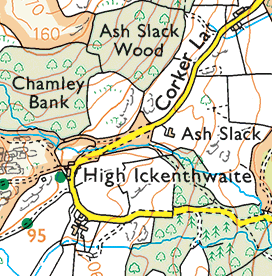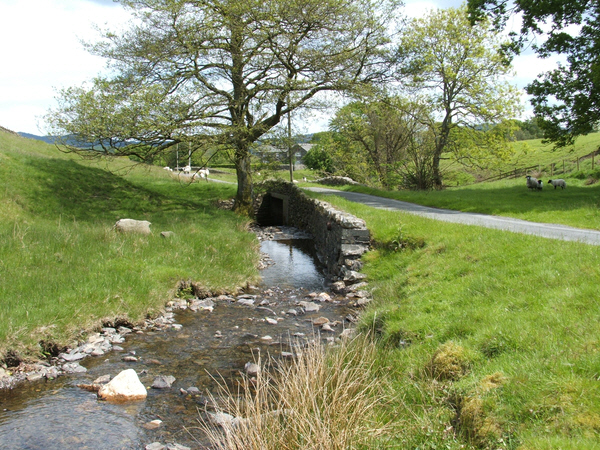| Home |
| The Origins of the Corker Name |
The Oxford English Dictionary gives a definition of cork as a ‘purple or red dye-stuff obtained from certain lichens growing on rocks in Scotland and the north of England’. In Gaelic and Irish corcur, meaning ‘purple’ derived from the Latin purpur, was the name for the lichen yielding a purple dye.
In early England, as an occupational surname, the name Corker identified a person who was a dyer of cloth with ‘cork’ (1).
Wakefield, West Yorkshire
In the late 13th century, during the reign of King Edward I, the Corker family was present in the area of the town of Wakefield in West Yorkshire. On Friday 4 October 1297 Adam le Corker was bringing an ox to sell at the Wakefield market when he was accused by Adam Gildstead of stealing the ox. Corker was arrested and sent to prison. Four weeks later, on Friday the first of November, he presented his case and was acquitted by the jurors. Gildstead was fined 3s. 4d. for making a false claim (2).
William Corker was named in the court held at Wakefield on Friday 10 March 1340 and again, two weeks later, on Friday 24 March. He was fined 2d. for a charge of trespass – further details were not revealed in the court records (3).
Possibly successive generations of the Corker family continued to live and prosper in the Wakefield area. Their trail is picked up in the parish registers that were formally introduced in England in 1538. From 1543 and onwards Corker family baptisms, marriages and burials were entered in the parish register of St Michael and Our Lady’s Church at Wragby (4). The Wragby parish church, at the entrance to the grounds of Nostell Priory, was located about six miles east of Wakefield.
James Corker, buried in the Wragby churchyard on 19 July 1573, left a will naming seven sons: John, Francis, Thomas, Leonard, Lionel, William, and Cotton; a married daughter Ann Crosbie, and two unmarried daughters Mary and Jane (who both later married). James Corker was survived by his wife Elizabeth (possibly her maiden name was Cotton) who died in about 1592 (5).
The Corker home was Huntwick Grange near Nostell Priory. This estate may have come into the possession of James Corker at the time of the dissolution of the monasteries, in the reign of Henry VIII, when land and property belonging to Nostell Priory was sold off. In 1596 Francis Corker of Hessle, a hamlet in the parish of Wragby close to Ackworth, sold Huntwick Grange to the Saltonstall family (6).
On 20 April 1567 James Corker was granted a lease for 31 years to the manor of Ackworth, and on 2 May 1573 he obtained a lease for 49 years to the keepership of Ackworth Park (7).
The will of James Corker, probated on 22 February 1573/4, revealed a family who had achieved some affluence. Property close to Huntwick Grange, inherited by his children, included the lease of the hall and mill at Ackworth, the corn mill at Sharlston, and the mills at Castleford. James Corker gave his son Thomas Corker property near Leeds, north of Wakefield, consisting of a lease in the parish of Guiseley and a share of the parsonage of Whitkirk.
James Corker also owned property further afield. His will mentioned the possession of the parsonage of Pennington, near the town of Ulverston in the Furness area, then in the county of Lancashire, now part of Cumbria. He gave his land and houses in Ulverston and Furness to his eldest son John Corker. This confirms a connection between the Corker family of West Yorkshire and the Corker family established in Ulverston.
Ulverston and the Furness Area
A local historian of Ulverston, noting that the Corker name was
‘closely related to the town for five centuries’,
described selected members of the family: (8)
Thomas Corker, coroner of Furness, died in 1430
[from the Oxford English Dictionary, in old England, a coroner was
an officer charged with maintaining the rights of crown property];
John Corker, ‘bailister’ [bailiff] of Ulverston, died in 1557; and
Thomas Corker, Ulverston registrar [keeper of parish records] in the 1650s.
There is a record that in 1574 a Leonard Corker was a member of a lively social group. This was revealed in a court appearance by William Sawrey, vicar of Urswick in the Furness peninsula near Ulverston, who was charged with ‘gaming and playing at cards and dice in his own house upon the Sabbath day in the time of divine service and that he had there accompanied him as well Leonard Corker, Edward Jackson and divers others’ (9).
Nevill Hall, a manor in Ulverston, was owned by the Nevill family until a setback in their fortunes in 1569. In 1585 Francis Corker was among the Liberi Tenantes (a type of property owner) of the manor. The Corkers lived at Nevill Hall for some time until the death of a Francis Corker in 1688 (10).
Ashslack, near Ulverston, was the home to a Corker family as documented in some Lancashire wills: (11)
| Testator | Probate Date |
|---|---|
| John Corker, a clothweaver of Ashslack,
Furness Fells, Colton | 20 Sep 1686 |
| Richard Corker of Ashslack and
Barkhousebank, Colton | 20 Jan 1705 |
| John Corker of Ashslack, Colton | 22 Apr 1724 |
Corker Lane, running by Ash Slack in the parish of Colton, is marked on a modern day Ordnance Survey map (Grid Reference: SD324895):
 |
| A view of Corker Lane near Ulverston |
 |
| Yew Beck where it flows under Corker Lane
Photograph © mauldy taken 31 May 2006, The Geograph Britain and Ireland project  . .
|
Liverpool and Manchester
There are early records of the Corker name in Liverpool and Manchester.
In 1385 ‘William the Corker’ lived at Litherland, in the English county of Lancashire, a short distance north of Liverpool. In 1408 Richard, the son of William the Corker, had property in the area. In 1506 Richard Corker, the son of Hugh, owned land in Litherland (12).
A document for property in Woolton, a district of Liverpool, dated 22 July 1414 recorded that the chaplain named John Totty occupied a house ‘by the gift of John le Corker in Magna Wolleton’. The property was granted to the heirs of John le Corker by Cecilia his wife and ‘Richard le Corker and his heirs, and the right and nearest heirs of William le Corker del Forde’ (13).
The Corker association with the Liverpool area continued – in 1514 William Corker was a constable of Much Woolton (14).
In 1350 Corkers were burgesses [residents] in Manchester (15). They kept their ties to the town: in 1581 Thomas Corker had the position of ‘precentor’ at Manchester Cathedral (16); in 1632 the court records of Manchester named Charles Corker as one of the two constables (17).
Notes
(1) J. R. Dolan, English Ancestral Names: The Evolution of the Surname from Medieval Occupations, New York, 1972, pp. 131 & 139; and Percy Hide Reaney, A Dictionary of English Surnames, online edition. Name variations for Corker included Corck, Cork, Corke, and Corklittster.
(2)
The Court Rolls of the Manor of Wakefield: Volume 2, 1297–1309,
The Yorkshire Archaeological Society Record Series, 1906, p. 11,
Internet Archive  .
.
(3)
The Court Rolls of the Manor of Wakefield: Volume 12, 1338–1340,
The Yorkshire Archaeological Society, 1999, pp. 174 & 179,
Internet Archive  .
.
(4) Transcribed records and parish register images from the Wragby parish register, West Yorkshire Archive Service, can be viewed at the Ancestry website.
(5) Transcribed wills of James Corker, probate date 22 February 1573/4, and Elizabeth Corker, probate date 11 June 1592, are in Major-General Thomas Martin Corker, ‘Corker, An Old Northumbrian Family‘, Yorkshire Archaeological Journal, Vol. 28, 1925, pp. 91–92. The author, Thomas Martin Corker (1856–1937), a direct descendant of James Corker’s son Francis, was a Corker family historian. A genealogy of his ancestors was published in the 1937 edition of Burke’s Landed Gentry.
(6)
West Yorkshire
Archive Service  online catalogue.
online catalogue.
(7)
Archives Hub  online catalogue:
Temple Newsam Family and Estate Records
held at West Yorkshire Archive Service, Leeds
(document reference: GB 205 LC000TN/8/2/2/1, date 20 May 1578).
online catalogue:
Temple Newsam Family and Estate Records
held at West Yorkshire Archive Service, Leeds
(document reference: GB 205 LC000TN/8/2/2/1, date 20 May 1578).
(8) Charles Wareing Endell Bardsley, Chronicles of the Town & Church of Ulverston, 1885, p. 46 (Google Book online).
(9)
A history of Urswick, in the Furness peninsula in Cumbria, by the
Revd Colin R. Honour, Ossik Coots and Collared Doves, 2011, p. 60
(pdf file  ).
).
A Leonard Corker was baptised at Ulverston on 15 August 1555
(FamilySearch Historical Records online).
(10)
Charles Wareing Endell Bardsley, op. cit., p. 46;
additional comment on the Corkers is in
Ulverston,
A History of the County of Lancaster  ,
,
(11)
Lancashire
Archives online catalogue  .
.
(12)
Litherland,
A History of the County of Lancaster  ,
,
(13)
Deeds of the Norris, or Norreys, family of Speke Hall, Lancashire,
Special Collections
& Archives  , University of Liverpool.
, University of Liverpool.
(14) Transactions of the Historic Society of Lancashire and Cheshire for the Year 1887, Vol. 39, 1889, p. 161 (Google Book online).
(15) Major-General Thomas Martin Corker, ‘Corker, An Old Northumbrian Family’, Yorkshire Archaeological Journal, Vol. 28, 1925, p. 89.
(16) Manchester Cathedral Archives catalogue viewed at The National Archives Discovery online database.
(17) Richard McKinley, The Surnames of Lancashire, London, 1981, p. 43.
Copyright © WhistlerHistory 2018.